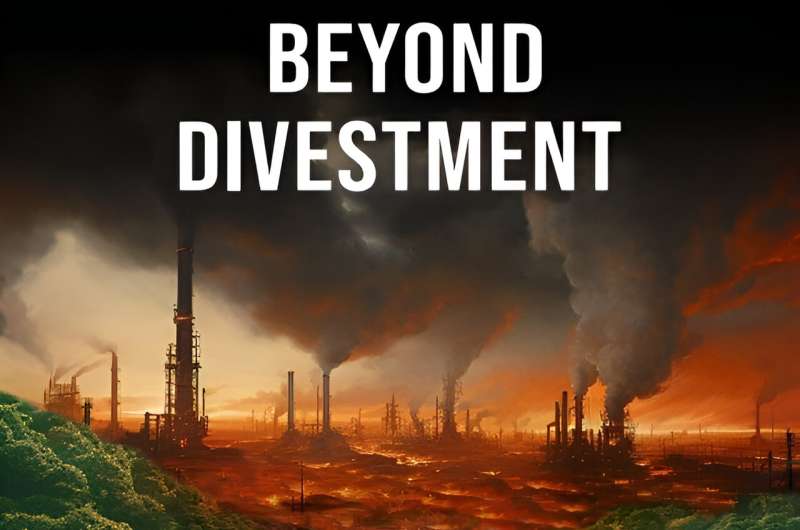This article has been reviewed according to Science X's editorial process and policies. Editors have highlighted the following attributes while ensuring the content's credibility:
fact-checked
trusted source
proofread
New report reveals BP and Shell divestment by small investors offset by mega-shareholder buys

Any divestment from BP and Shell by investors is cancelled out by the top 20 mega-shareholders' acquisition of shares according to new report from the Center for Climate Crime and Climate Justice at Queen Mary University of London
As executives of the world's biggest oil and gas companies take part in a three-day conference this week in London, a new report published Oct. 18 from the Center for Climate Crime and Climate Justice at Queen Mary University of London, and Corporate Watch examines the impact of divestment campaigns on BP and Shell, and to look at how we might be able to secure effective withdrawal of investment in fossil fuels.
The report, "Beyond Divestment," is a follow-up to the earlier report "Carbon Cash Machine," which found that the cash earnings accumulated shareholders in Britain's two largest oil companies—BP and Shell—are around triple the amount they were when the Paris Agreement was signed in December 2015.
"Beyond Divestment" shines a light on the impact of growing demands made upon shareholders to divest from fossil fuels. Divestment campaigns seek to persuade institutions such as universities, charitable foundations, and pension funds to withdraw funds from fossil fuel companies as part of a broader range of measures necessary to address the global climate crisis.
The report reveals that:
- Although 47% of BP shareholders and 54% of Shell shareholders have reduced their stake in Shell and BP, net share ownership has risen by 10% in both BP and Shell.
- Moreover, what might look like divestment cannot always be read as such; more than a quarter of the 20 investors who made the most significant reductions in shareholdings in either BP or Shell actually increased their shares in the other company.
- Any trend towards divestment among the 47% and 54% of BP and Shell shareholders is being cancelled out by the largest shareholders, who happen to include the world's largest and most powerful asset managers.
- Only 60 institutional investors have sold all their shares in the two oil firms. This represents 3% of BP and 4% of Shell shareholders.
- The enormous increase in both market capitalization and share price for the two oil giants since the Paris Agreement reaffirms the conclusion that divestment campaigns are not having the necessary impact.
- If shareholder divestment is not working fast enough—as this report shows—then we need to pursue other forms of intervention that drastically scale back oil and gas production.
Co-author of report Professor David Whyte, and Director of the Center for Climate Crime and Climate Justice, Queen Mary University of London said, "It is clear that the level of divestment needed to mitigate global warming will not be achieved by simply transferring the ownership of shares, unless those shares are acquired by organizations that will keep the fossil fuels in the ground."
The report provides in-depth data of the largest 20 divestors by number of shares for BP and Shell respectively, revealing five of BP's biggest divestors have increased their shareholding in Shell, and seven of Shell's biggest divestors have increased their shareholding in BP.
"On this basis, divestment is not divestment at all: it is reinvestment" explains Professor Whyte. "If a target of limiting global warming to the levels necessary for planetary survival is to be kept within our reach, all of the evidence we have indicates that we need to stop producing oil and gas now. If shareholder divestment is not working fast enough to achieve this—as this report shows—then we need to pursue other forms of intervention that drastically scale back production."
Provided by Queen Mary, University of London





















